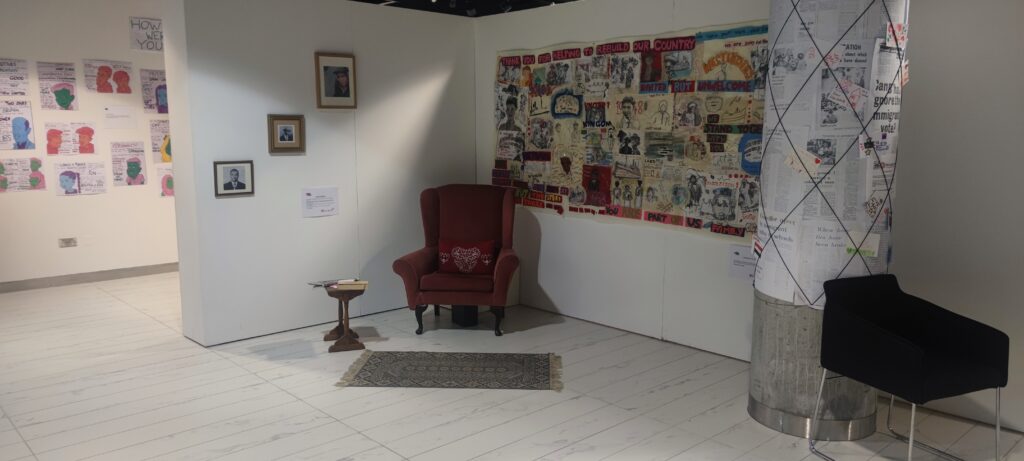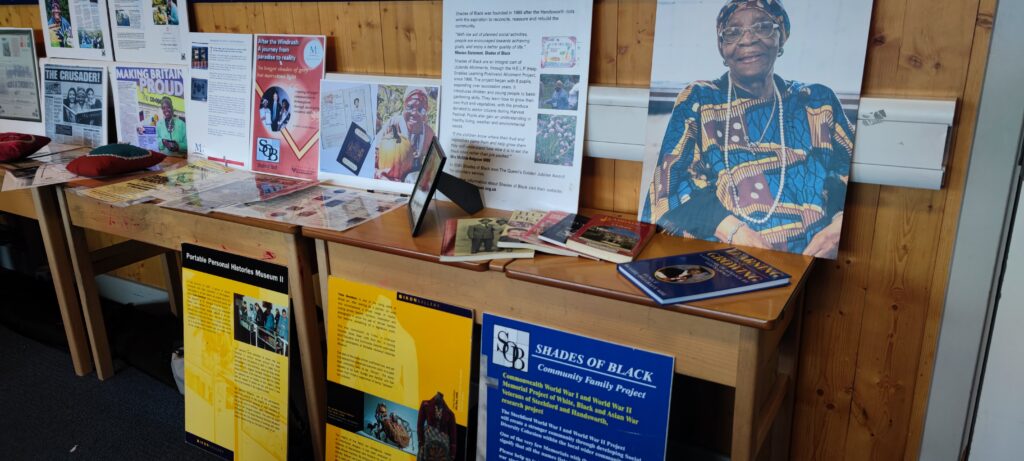Saving stories to share stories at risk
Our recent work with Friction and the Library of Birmingham has been underpinned by Archives – exploring, documenting and creating new responses to them, building a fuller picture of our city by the people least well represented in it.
The partnership began with support From The National Archives ‘Records at Risk’ programme. In 2022 Friction were fortunate to receive funding from the Arts Council for a substantial refurbishment of the Edge, their HQ, which meant the entire building would need to be emptied, stored and then returned to the new building a year later. Friction saw this as an opportunity to work with PHC to establish an Archive, put in place policies and procedures to better secure and work with stories and artwork from their past, to meet and empower the people we work with.
We’ve been working with volunteers, staff and artists to catalogue existing material as well as use and build on it. Our policies and procedures are making sure we are cataloguing and digitising what we value, and also sampling artwork and other material as part of a repository archive. Building work at the Edge and our ‘Records at Risk’ project are not yet complete (when ever is an archive complete!) but there have already been some exciting outcomes, and influences on other projects.
Our shared vision, the purpose of our archives and contact with the Library of Birmingham led to ‘At Home with Friction‘ – an exhibition looking at the ‘evolution of Friction Arts’ practice over the past three decades or so, as well as our commitment to creating accessible and inclusive art experiences.’. The exhibition has been open from 3rd April to 26th August 2023 in floor 3 gallery, Library of Birmingham.
PHC and Friction also began talking to Mrs. McGhie-Belgrave MBE of Shades of Black about the 75th anniversary ‘Meeting Windrush‘. Shades of Black are already represented in Library of Birmingham Archives, but only up to 2009. ‘Windrush Day’ itself was only formally recognised nationally in 2018, and we were able to work with Friction, Shades of Black, and Windrush75 partners from across the city to better represent stories of people coming to our city. With Birmingham City Council funding, we have been documenting Birmingham Windrush stories to expand Birmingham Heritage and Archives to include more, and more recent, stories of people of colour in our city in their own words.
Archives are increasingly being used throughout projects at Friction to inform, explore and develop ideas, leading to new creative and valuable stories feeding back into Friction Archives. For example we are working with ‘Everything to Everybody‘ University of Birmingham project with the Library of Birmingham and Friction for ‘Hear Here’ project. This project is about listening and hearing the voices of Birmingham’s women, documenting their stories, and supporting women to creatively represent themselves through the arts. As well as creating art, poems and performances influenced by the story of Ophelia and the Shakespeare Memorial Collection, we are adding voices and stories of the women admired by participants to be added alongside other collections in Birmingham Archives at the Library of Birmingham.
‘Records at Risk’ is focused on saving a culturally significant collection representing and reflecting individuals and communities worked with in Birmingham since 1992 at Friction, including artwork, performance, as well as primary source interviews, photography and film. In putting in place systems, support and training for staff and volunteers at Friction, as well as managing a programme of activities to meet our objectives, we have nurtured valuing of the collection locally and nationally and highlighted the importance to make the collection more accessible to a wider audience.
‘Records at Risk’ has provided a spark, helping develop partnerships between PHC, Friction, The Library of Birmingham, Shades of Black, artists and people across our city. This work has also led to conversations with artists like Vanley Burke about ‘How we can preserve some idea of history within this space (Handsworth) to make it clear that we are not just passing through’.
Our work on ‘Records at Risk’ has put in mind that when records are ‘at risk’ so are relationships, particularly of people who deserve to be better represented and in their own voices. Most importantly you make creative opportunities through partnership, conversation and sharing stories.

Discussing Windrush at Handsworth Library, using Archive material. Photograph thanks Soheila Javaheri 
Diane Malcolm interviewed her father, Winston Malcolm. Interview plays from within a seat, next to dominoes, betting slips and his portrait – part of a series of interviews documenting Generation Windrush. 
Text describing each part of the exhibition covering 30 years of Friction history, ‘At Home with Friction’. Each part is digitised and catalogued as part of ‘Records at Risk’ 
‘Hear Here’ exhibition at Shakespeare Memorial Room, demonstrationg the value of ‘Working with Archives’ 
Joanne Tremarco prepares artwork and stories alongside Archive material from Birmingham Archives and Heritage 
Displayed at Stechford Primary, catalogued and listed for Birmingham Archives and Heritage, digitised for wider use with Shades of Black and Friction 
Mrs. McGhie-Belgrave MBE presents to pupils about Windrush. They explore her archive and prepare short pieces about their experience and understanding of Windrush


